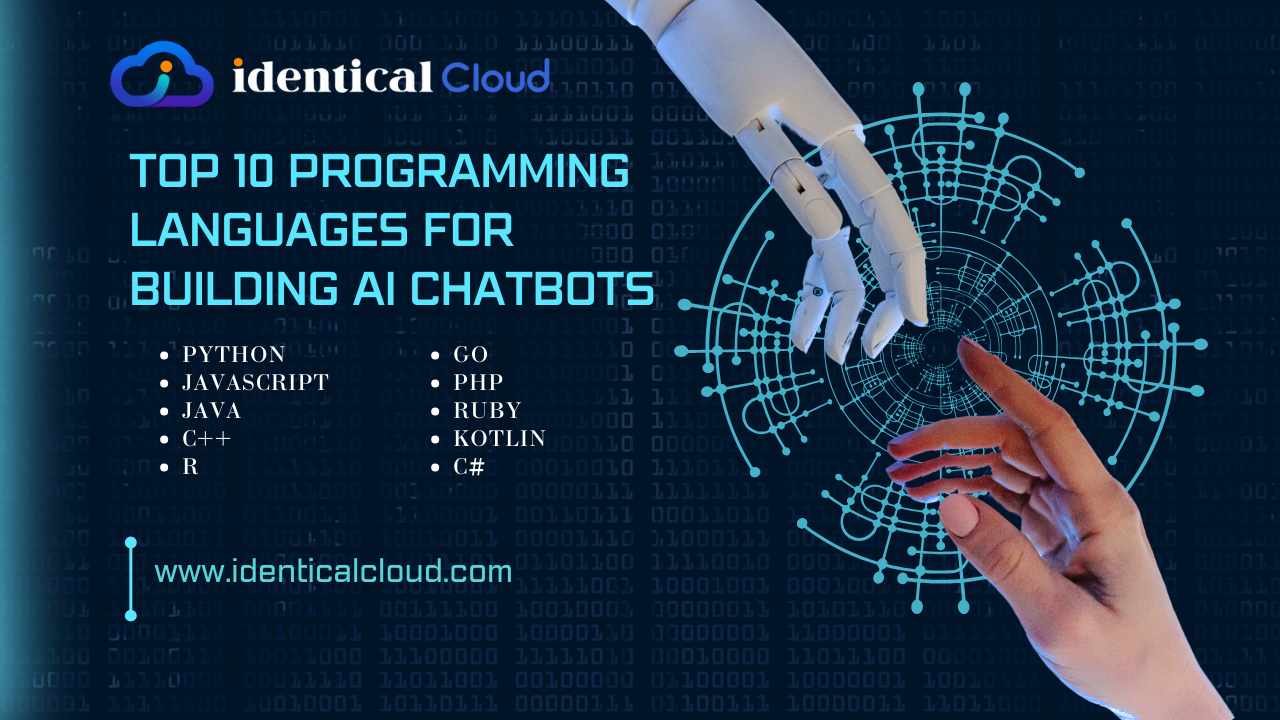
Top 10 Programming Languages for Building AI Chatbots
Top 10 Programming Languages for Building AI Chatbots
AI chatbots are becoming increasingly popular as a way to interact with customers and provide support. They are also being used in a variety of other applications, such as education, marketing, and healthcare.
Building AI chatbots involves a combination of programming languages, libraries, and frameworks. The choice of programming language largely depends on the specific requirements of your project and your familiarity with a particular language.
Here are the top 10 programming languages often used for building AI chatbots:
1. Python
Python is a general-purpose programming language that is used for a wide variety of tasks, including web development, data science, machine learning, and artificial intelligence. It is known for its simple syntax and readability, making it a good choice for beginners and experienced programmers alike.
Python has a large community of developers and a rich ecosystem of libraries and tools, which makes it easy to get started with Python and to find the resources you need to build your project.
Benefits of Python
- Easy to learn: Python has a simple and concise syntax, making it relatively easy to learn, even for beginners with no prior programming experience.
- Powerful: Python is a powerful language that can be used for a wide variety of tasks, including web development, data science, machine learning, and artificial intelligence.
- Versatile: Python can be used to develop a wide variety of applications, from simple scripts to complex enterprise-grade systems.
- Free and open source: Python is a free and open source language, which means that it is free to use and modify.
- Large community and ecosystem: Python has a large and active community of developers, which means that there are a wealth of resources available to help you learn and use the language. There is also a rich ecosystem of Python libraries and tools available, which can save you a lot of time and effort when developing your applications.
Features of Python
- Interpreted language: Python is an interpreted language, which means that your code is executed line by line as it is read by the interpreter. This makes it easy to debug your code and to experiment with different ideas.
- Dynamically typed language: Python is a dynamically typed language, which means that you do not need to declare the data type of your variables. This makes Python code more concise and readable.
- Object-oriented programming: Python supports object-oriented programming, which allows you to model real-world objects in your code. This can make your code more reusable and maintainable.
- Functional programming: Python also supports functional programming, which allows you to write code that is more expressive and declarative. This can make your code more concise and readable.
Popularity of Python
Python is one of the most popular programming languages in the world. It is used by a wide range of organizations, including startups, large corporations, and government agencies. Python is also popular in the academic world, where it is used for teaching and research.
Here are the reasons why Python is so popular:
- Easy to learn and use: Python has a simple and concise syntax, making it relatively easy to learn, even for beginners with no prior programming experience.
- Powerful and versatile: Python is a powerful and versatile language that can be used for a wide variety of tasks, including web development, data science, machine learning, and artificial intelligence.
- Large and active community: Python has a large and active community of developers, which means that there are a wealth of resources available to help you learn and use the language. There is also a rich ecosystem of Python libraries and tools available, which can save you a lot of time and effort when developing your applications.
Python libraries and tools
Here are some examples of Python libraries and tools that can be used for AI chatbot development:
- NLTK: NLTK is a popular Python library for natural language processing. It can be used to develop AI chatbots that can understand and generate human language.
- Scikit-learn: Scikit-learn is a popular Python library for machine learning. It can be used to develop AI chatbots that can learn from data and make predictions.
- TensorFlow: TensorFlow is a popular Python library for deep learning. It can be used to develop AI chatbots that can learn complex patterns from data.
Overall, Python is a great choice for programming beginners and experienced programmers alike. It is a powerful and versatile language with a large and active community.
2. JavaScript
JavaScript is a high-level, interpreted programming language that is used to make web pages interactive. It is one of the three core technologies of World Wide Web content production, alongside HTML and CSS. JavaScript is used to add special effects and functionality to web pages, such as animations, menus, and forms. It can also be used to develop web applications and games.
JavaScript is a popular programming language because it is easy to learn and use, and it is supported by all major web browsers. It is also a very versatile language, and it can be used to create a wide variety of interactive web pages and applications.
Benefits of JavaScript
Here are some of the benefits of using JavaScript:
- Easy to learn and use: JavaScript has a simple and concise syntax, making it relatively easy to learn, even for beginners with no prior programming experience.
- Powerful and versatile: JavaScript is a powerful and versatile language that can be used to create a wide variety of interactive web pages and applications.
- Ubiquitous: JavaScript is supported by all major web browsers, which means that your JavaScript code will work on virtually all devices and platforms.
- Open source: JavaScript is an open source language, which means that it is free to use and modify.
- Large and active community: JavaScript has a large and active community of developers, which means that there are a wealth of resources available to help you learn and use the language. There is also a rich ecosystem of JavaScript libraries and tools available, which can save you a lot of time and effort when developing your web applications.
Features of JavaScript
Here are some of the features of JavaScript:
- Interpreted language: JavaScript is an interpreted language, which means that your code is executed line by line as it is read by the interpreter. This makes it easy to debug your code and to experiment with different ideas.
- Dynamically typed language: JavaScript is a dynamically typed language, which means that you do not need to declare the data type of your variables. This makes JavaScript code more concise and readable.
- Object-oriented programming: JavaScript supports object-oriented programming, which allows you to model real-world objects in your code. This can make your code more reusable and maintainable.
- Functional programming: JavaScript also supports functional programming, which allows you to write code that is more expressive and declarative. This can make your code more concise and readable.
JavaScript libraries and frameworks
Here are some examples of popular JavaScript libraries and frameworks:
- jQuery: jQuery is a popular JavaScript library that makes it easy to select and manipulate DOM elements.
- React: React is a popular JavaScript library that is used to build user interfaces.
- Angular: Angular is a popular JavaScript framework that is used to build web applications.
- Vue.js: Vue.js is a popular JavaScript framework that is used to build web applications.
Overall, JavaScript is a powerful and versatile programming language that is well-suited for developing interactive web pages and applications. It is also a good choice for beginners because it is easy to learn and use.
3. Java
Java is a general-purpose programming language that is used for a wide variety of tasks, including web development, mobile development, enterprise software development, and big data processing. It is known for its portability, reliability, and performance.
Java is a compiled language, which means that your Java code is converted into machine code before it is executed. This makes Java code very fast and efficient. Java is also a platform-independent language, which means that Java code can be executed on any platform that has a Java Virtual Machine (JVM).
Java is a popular programming language because it is versatile, reliable, and performant. It is also a good choice for beginners because it has a well-designed syntax and a large community of developers.
Benefits of Java
Here are some of the benefits of using Java:
- Versatile: Java can be used to develop a wide variety of applications, from simple web pages to complex enterprise systems.
- Reliable: Java is a very reliable language. It is known for its stability and security.
- Performant: Java code is very fast and efficient. It is also very scalable, which means that Java applications can handle large amounts of data and traffic.
- Portable: Java code can be executed on any platform that has a Java Virtual Machine (JVM).
- Large and active community: Java has a large and active community of developers. This means that there are a wealth of resources available to help you learn and use the language. There is also a rich ecosystem of Java libraries and tools available, which can save you a lot of time and effort when developing your applications.
Features of Java
Here are some of the features of Java:
- Object-oriented programming: Java supports object-oriented programming, which allows you to model real-world objects in your code. This can make your code more reusable and maintainable.
- Strong typing: Java is a strongly typed language, which means that you must declare the data type of your variables. This helps to prevent errors and makes your code more reliable.
- Garbage collection: Java has a built-in garbage collector that automatically manages memory allocation and deallocation. This frees you from having to worry about memory management and helps to prevent memory leaks.
- Security: Java is a very secure language. It has a number of features that help to protect your applications from security threats.
Java libraries and frameworks
Here are some examples of popular Java libraries and frameworks:
- Spring Boot: Spring Boot is a popular Java framework that makes it easy to develop web applications.
- Hibernate: Hibernate is a popular Java object-relational mapping (ORM) library that makes it easy to interact with databases.
- Maven: Maven is a popular Java build automation tool.
- Gradle: Gradle is another popular Java build automation tool.
Overall, Java is a powerful and versatile programming language that is well-suited for developing a wide variety of applications. It is also a good choice for beginners because it has a well-designed syntax and a large community of developers.
4. C++
C++ is a general-purpose programming language that is known for its performance, efficiency, and flexibility. It is used for a wide variety of applications, including operating systems, embedded systems, games, and high-performance computing.
C++ is a compiled language, which means that your C++ code is converted into machine code before it is executed. This makes C++ code very fast and efficient. C++ is also a platform-independent language, which means that C++ code can be executed on any platform that has a C++ compiler.
C++ is a powerful and versatile language, but it can be difficult to learn and use. It is important to have a good understanding of programming concepts such as data structures, algorithms, and memory management before you start learning C++.
Benefits of C++
Here are some of the benefits of using C++:
- Performance: C++ code is very fast and efficient. It is also very scalable, which means that C++ applications can handle large amounts of data and traffic.
- Flexibility: C++ is a very flexible language. It gives you a lot of control over how your code works. This makes C++ a good choice for developing high-performance and resource-constrained applications.
- Large and active community: C++ has a large and active community of developers. This means that there are a wealth of resources available to help you learn and use the language. There is also a rich ecosystem of C++ libraries and tools available, which can save you a lot of time and effort when developing your applications.
Features of C++
Here are some of the features of C++:
- Object-oriented programming: C++ supports object-oriented programming, which allows you to model real-world objects in your code. This can make your code more reusable and maintainable.
- Generic programming: C++ supports generic programming, which allows you to write code that can be reused with different data types. This can make your code more concise and efficient.
- Exception handling: C++ supports exception handling, which allows you to handle errors in your code in a controlled manner. This can make your code more reliable and robust.
- Memory management: C++ gives you direct control over memory management. This allows you to optimize your code for performance and memory usage.
C++ libraries and frameworks
Here are some examples of popular C++ libraries and frameworks:
- Boost: Boost is a large collection of C++ libraries that provide a wide range of functionality.
- Qt: Qt is a cross-platform application development framework that is written in C++.
- OpenGL: OpenGL is a cross-platform graphics library that is used in many games and other applications.
- Vulkan: Vulkan is a cross-platform graphics library that is designed for high-performance and low-power applications.
Overall, C++ is a powerful and versatile programming language that is well-suited for developing a wide variety of applications. It is also a good choice for beginners because it has a well-designed syntax and a large community of developers. However, it is important to note that C++ can be difficult to learn and use, so it is important to have a good understanding of programming concepts before you start learning C++.
5. R
R is a programming language and free software environment for statistical computing and graphics. It is supported by the R Foundation for Statistical Computing. The R language is widely used among statisticians and data miners for developing statistical software and data analysis.
R is a high-level language, meaning that it is relatively easy to learn and use. It has a simple syntax and a large community of users and developers. R is also very versatile and can be used for a wide variety of tasks, including:
- Data analysis and visualization
- Statistical modeling
- Machine learning
- Natural language processing
- Financial modeling
- Web development
- And more!
R is also a free and open source language, which means that it is free to use and modify. This makes it a great choice for students, researchers, and businesses of all sizes.
Benefits of R
Here are some of the benefits of using R:
- Free and open source: R is free to use and modify. This makes it a great choice for students, researchers, and businesses of all sizes.
- Versatile: R can be used for a wide variety of tasks, including data analysis and visualization, statistical modeling, machine learning, natural language processing, financial modeling, and web development.
- Powerful: R is a powerful language that can be used to perform complex statistical analysis and machine learning tasks.
- Large community: R has a large community of users and developers. This means that there are a wealth of resources available to help you learn and use the language.
Features of R
Here are some of the features of R:
- Vectorized programming: R uses vectorized programming, which means that you can operate on entire vectors of data at once. This makes R very efficient for data analysis and manipulation.
- Powerful statistical functions: R has a wide range of built-in statistical functions. This makes it easy to perform complex statistical analysis without having to write your own code.
- Graphics: R has a powerful graphics engine that can be used to create high-quality data visualizations.
- Packages: R has a large ecosystem of packages that provide additional functionality. This means that you can easily extend the capabilities of R to meet your specific needs.
Here are some examples of popular R packages:
- dplyr: dplyr is a popular R package for data manipulation.
- ggplot2: ggplot2 is a popular R package for data visualization.
- caret: caret is a popular R package for machine learning.
- rpart: rpart is a popular R package for decision trees.
- randomForest: randomForest is a popular R package for random forests.
Overall, R is a powerful and versatile programming language that is well-suited for a wide variety of tasks, particularly data analysis and statistical modeling. It is also a free and open source language with a large community of users and developers. This makes it a great choice for students, researchers, and businesses of all sizes.
6. Go
Go, also known as Golang, is a general-purpose programming language that is developed by Google. It is known for its simplicity, concurrency support, and performance. Go is used for a wide variety of applications, including web development, cloud computing, machine learning, and more.
Go is a compiled language, which means that your Go code is converted into machine code before it is executed. This makes Go code very fast and efficient. Go is also a platform-independent language, which means that Go code can be executed on any platform that has a Go compiler.
Go is a relatively new language, but it has quickly become popular among developers. This is due to its simplicity, performance, and concurrency support. Go is also well-suited for developing distributed systems and microservices.
Benefits of Go
Here are some of the benefits of using Go:
- Simple: Go is a very simple language to learn and use. It has a small syntax and a few core concepts. This makes it a good choice for beginners and experienced programmers alike.
- Concurrent: Go has built-in support for concurrency. This makes it easy to write code that can run multiple tasks simultaneously. This is important for developing high-performance and scalable applications.
- Performant: Go code is very fast and efficient. It is also very scalable, which means that Go applications can handle large amounts of data and traffic.
- Platform-independent: Go code can be executed on any platform that has a Go compiler. This makes it easy to deploy Go applications to different platforms.
- Large and active community: Go has a large and active community of developers. This means that there are a wealth of resources available to help you learn and use the language. There is also a rich ecosystem of Go libraries and tools available, which can save you a lot of time and effort when developing your applications.
Features of Go
Here are some of the features of Go:
- Structural typing: Go uses structural typing, which means that the type of a variable is determined by its value, not its declaration. This makes Go code more flexible and easier to maintain.
- Garbage collection: Go has built-in garbage collection, which means that you do not have to worry about memory management.
- Interfaces: Go supports interfaces, which allow you to decouple the implementation of a code from its usage. This makes Go code more reusable and maintainable.
- Tooling: Go has a good set of tooling available, including a compiler, linker, and debugger. This makes it easy to develop, build, and test Go applications.
Go libraries and frameworks
Here are some examples of popular Go libraries and frameworks:
- Gin: Gin is a popular Go web framework.
- Echo: Echo is another popular Go web framework.
- Gorilla: Gorilla is a collection of Go libraries that provide a wide range of functionality.
- Negroni: Negroni is a popular Go middleware framework.
- Kubernetes: Kubernetes is a popular Go container orchestration platform.
Overall, Go is a powerful and versatile programming language that is well-suited for a wide variety of applications. It is also a simple, performant, and concurrent language with a large and active community.
7. PHP
PHP (Hypertext Preprocessor) is a general-purpose scripting language that is especially suited to web development. Fast, flexible and pragmatic, PHP powers everything from your blog to the most popular websites in the world.
PHP is a server-side scripting language, which means that the code is executed on the server before the web page is sent to the user’s browser. This makes PHP a good choice for developing dynamic web pages, such as those that generate content from a database or allow users to interact with the page.
PHP is also a very versatile language. It can be used to develop a wide variety of web applications, including:
- Content management systems (CMS) such as WordPress and Drupal
- E-commerce platforms such as Magento and WooCommerce
- Social networking sites such as Facebook and Twitter
- Discussion forums such as phpBB and vBulletin
- And more!
PHP is also relatively easy to learn and use. It has a simple syntax and a large community of users and developers. This means that there are a wealth of resources available to help you learn and use the language.
Benefits of PHP
Here are some of the benefits of using PHP:
- Free and open source: PHP is a free and open source language. This means that it is free to use and modify.
- Versatile: PHP can be used to develop a wide variety of web applications.
- Powerful: PHP is a powerful language that can be used to perform complex tasks.
- Easy to learn: PHP is relatively easy to learn and use.
- Large community: PHP has a large community of users and developers. This means that there are a wealth of resources available to help you learn and use the language.
Features of PHP
Here are some of the features of PHP:
- Object-oriented programming: PHP supports object-oriented programming, which allows you to model real-world objects in your code. This can make your code more reusable and maintainable.
- Database support: PHP has built-in support for a variety of databases, including MySQL, PostgreSQL, and Oracle. This makes it easy to develop web applications that interact with databases.
- Sessions: PHP supports sessions, which allow you to track user activity across multiple pages. This is useful for developing web applications such as shopping carts and login systems.
- Security: PHP has a number of built-in security features that can help to protect your web applications from attacks.
PHP frameworks and libraries
Here are some examples of popular PHP frameworks and libraries:
- Laravel: Laravel is a popular PHP framework that makes it easy to develop web applications.
- Symfony: Symfony is another popular PHP framework that is known for its flexibility and scalability.
- CodeIgniter: CodeIgniter is a lightweight PHP framework that is well-suited for small and medium-sized projects.
- Composer: Composer is a dependency manager for PHP that makes it easy to install and manage PHP libraries.
- Doctrine: Doctrine is a popular PHP object-relational mapping (ORM) library that makes it easy to interact with databases.
Overall, PHP is a powerful and versatile programming language that is well-suited for web development. It is also a free and open source language with a large community of users and developers.
8. Ruby
Ruby is a general-purpose, dynamic programming language that is known for its simplicity and expressiveness. It is used for a wide variety of tasks, including web development, data science, machine learning, and more.
Ruby is an interpreted language, which means that your Ruby code is executed line by line as it is read by the interpreter. This makes it easy to debug your code and to experiment with different ideas. Ruby is also a dynamic language, which means that you do not need to declare the data type of your variables. This makes Ruby code more concise and readable.
Ruby has a large and active community of developers. This means that there are a wealth of resources available to help you learn and use the language. There is also a rich ecosystem of Ruby libraries and tools available, which can save you a lot of time and effort when developing your applications.
Benefits of Ruby
Here are some of the benefits of using Ruby:
- Simple and expressive: Ruby has a simple and expressive syntax, which makes it easy to read and write Ruby code.
- Dynamic: Ruby is a dynamic language, which means that you do not need to declare the data type of your variables. This makes Ruby code more concise and readable.
- Versatile: Ruby can be used for a wide variety of tasks, including web development, data science, machine learning, and more.
- Large and active community: Ruby has a large and active community of developers. This means that there are a wealth of resources available to help you learn and use the language.
- Rich ecosystem: Ruby has a rich ecosystem of libraries and tools available, which can save you a lot of time and effort when developing your applications.
Features of Ruby
Here are some of the features of Ruby:
- Object-oriented programming: Ruby supports object-oriented programming, which allows you to model real-world objects in your code. This can make your code more reusable and maintainable.
- Blocks: Ruby supports blocks, which are anonymous functions that can be passed to methods and used as closures. This makes Ruby code more concise and expressive.
- Iterators: Ruby supports iterators, which allow you to iterate over collections of data. This makes it easy to write code that processes large amounts of data.
- Metaprogramming: Ruby supports metaprogramming, which allows you to inspect and modify the structure of Ruby code at runtime. This makes Ruby a powerful and flexible language.
Ruby libraries and frameworks
Here are some examples of popular Ruby libraries and frameworks:
- Rails: Rails is a popular Ruby web framework that makes it easy to develop web applications.
- Sinatra: Sinatra is a lightweight Ruby web framework that is well-suited for small and medium-sized projects.
- Hanami: Hanami is a modern Ruby web framework that emphasizes performance and scalability.
- Rspec: Rspec is a popular Ruby testing framework that makes it easy to test your Ruby code.
- RuboCop: RuboCop is a popular Ruby code linter that helps you to write clean and consistent Ruby code.
Overall, Ruby is a powerful and versatile programming language that is well-suited for a wide variety of tasks. It is also a simple and expressive language with a large and active community.
9. Kotlin
Kotlin is a statically typed, general-purpose programming language with type inference. It is designed to interoperate fully with Java, and the JVM version of Kotlin’s standard library depends on the Java Class Library, but type inference allows its syntax to be more concise. Kotlin mainly targets the JVM, but also compiles to JavaScript (e.g., for frontend web applications using React) or native code via LLVM (e.g., for native iOS apps sharing business logic with Android apps).
Kotlin was developed by JetBrains, who are also the creators of the IntelliJ IDEA IDE. Kotlin was first released in 2011 and has quickly become one of the most popular programming languages for Android development. Kotlin was also announced as one of the official languages for server-side development on Google Cloud Platform in 2017.
Benefits of Kotlin
Here are some of the benefits of using Kotlin:
- Concise: Kotlin has a concise and expressive syntax, which makes it easy to read and write Kotlin code.
- Safe: Kotlin is a statically typed language, which helps to prevent errors at runtime.
- Powerful: Kotlin is a powerful language that can be used to develop a wide variety of applications, including Android apps, server-side apps, and web applications.
- Interoperable: Kotlin is fully interoperable with Java, which means that you can use Kotlin code alongside Java code.
- Large and active community: Kotlin has a large and active community of developers, which means that there are a wealth of resources available to help you learn and use the language.
Features of Kotlin
Here are some of the features of Kotlin:
- Object-oriented programming: Kotlin supports object-oriented programming, which allows you to model real-world objects in your code.
- Functional programming: Kotlin also supports functional programming, which allows you to write code that is more expressive and declarative.
- Type inference: Kotlin has type inference, which means that you do not need to declare the data type of your variables. This makes Kotlin code more concise and readable.
- Coroutines: Kotlin supports coroutines, which allow you to write asynchronous code in a simple and efficient way.
Kotlin libraries and frameworks
Here are some examples of popular Kotlin libraries and frameworks:
- Spring Boot: Spring Boot is a popular Java framework that makes it easy to develop web applications. Kotlin can be used with Spring Boot to develop web applications that are both concise and powerful.
- Ktor: Ktor is a lightweight Kotlin web framework that is well-suited for small and medium-sized projects.
- Koin: Koin is a popular Kotlin dependency injection framework.
- Anko: Anko is a Kotlin library that makes it easy to develop Android apps.
- Arrow: Arrow is a Kotlin library that provides a number of functional programming features.
Overall, Kotlin is a powerful and versatile programming language that is well-suited for a wide variety of tasks, particularly Android development. It is also a concise and safe language with a large and active community.
10. C#
C# is a general-purpose, high-level programming language developed by Microsoft as part of its .NET Framework. It is a modern, object-oriented, and type-safe language that is used to develop a wide variety of applications, including web applications, desktop applications, mobile applications, games, and more.
C# is a compiled language, which means that your C# code is converted into machine code before it is executed. This makes C# code very fast and efficient. C# is also a platform-independent language, which means that C# code can be executed on any platform that has a .NET runtime.
C# is a popular programming language because it is easy to learn and use, and it is supported by a large community of developers. C# also has a rich ecosystem of libraries and tools, which makes it easy to develop complex applications.
Benefits of c#
Here are some of the benefits of using C#:
- Easy to learn and use: C# has a simple and concise syntax, which makes it easy to learn and use.
- Powerful and versatile: C# is a powerful and versatile language that can be used to develop a wide variety of applications.
- Type-safe: C# is a type-safe language, which helps to prevent errors at runtime.
- Performant: C# code is very fast and efficient.
- Platform-independent: C# code can be executed on any platform that has a .NET runtime.
- Large and active community: C# has a large and active community of developers. This means that there are a wealth of resources available to help you learn and use the language.
- Rich ecosystem: C# has a rich ecosystem of libraries and tools, which makes it easy to develop complex applications.
Features of C#
Here are some of the features of C#:
- Object-oriented programming: C# supports object-oriented programming, which allows you to model real-world objects in your code.
- Generics: C# supports generics, which allow you to write code that can be reused with different data types.
- Asynchronous programming: C# supports asynchronous programming, which allows you to write code that can perform multiple tasks simultaneously.
- LINQ: C# supports LINQ (Language Integrated Query), which is a powerful query language that can be used to query data from a variety of sources.
C# libraries and frameworks
Here are some examples of popular C# libraries and frameworks:
- ASP.NET: ASP.NET is a popular C# web framework that makes it easy to develop web applications.
- WPF: WPF is a popular C# framework that makes it easy to develop desktop applications.
- Xamarin: Xamarin is a popular C# framework that makes it easy to develop mobile applications for iOS, Android, and Windows.
- Unity: Unity is a popular C# game engine.
- Entity Framework: Entity Framework is a popular C# object-relational mapping (ORM) library that makes it easy to interact with databases.
Overall, C# is a powerful and versatile programming language that is well-suited for a wide variety of tasks. It is also an easy to learn and use language with a large and active community.
How to choose the right programming language for your AI chatbot
The best programming language for building an AI chatbot depends on the specific requirements of the project. However, the languages listed above are all popular choices for chatbot development and offer a variety of features and benefits.
Here are some factors to consider when choosing a programming language for your AI chatbot:
- The complexity of your chatbot: If you are building a simple chatbot, you may be able to use a general-purpose programming language such as Python or JavaScript. However, if you are building a more complex chatbot, you may need to use a language such as C++ or Java.
- The platform you want to deploy your chatbot on: If you want to deploy your chatbot on a web server, you will need to use a language that is supported by web servers, such as Python, JavaScript, or PHP. If you want to deploy your chatbot on a mobile device, you will need to use a language that is supported by mobile platforms, such as Kotlin or C#.
- The team you have: If you have a team of developers who are experienced in a particular programming language, it is best to choose that language for your chatbot project. This will make it easier for the team to develop and maintain the chatbot.








